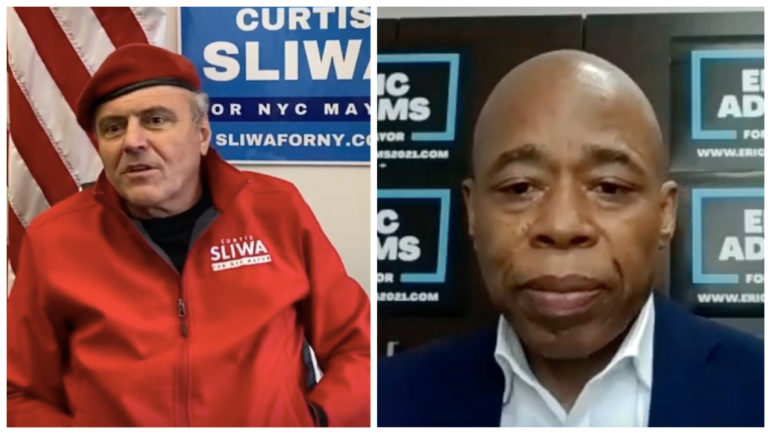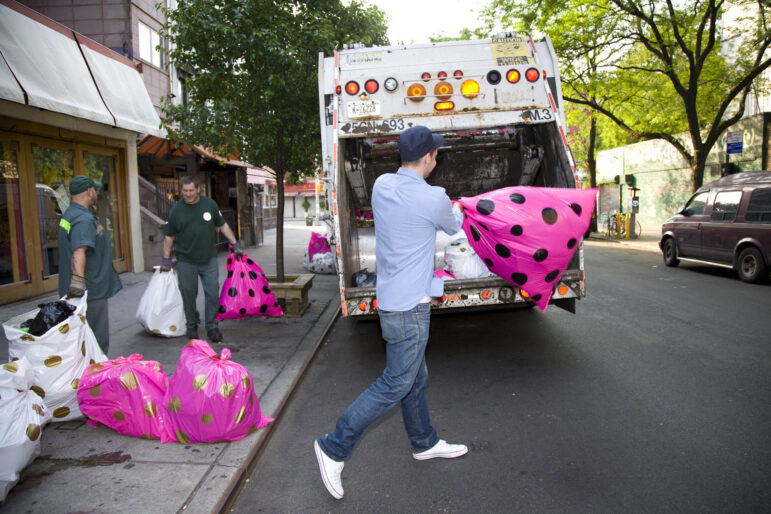City Limits sat down with Democrat Eric Adams and Republican Curtis Sliwa to quiz them about what they would do, if elected, to address the city’s ongoing housing and homelessness crises—specifically their policies when it comes to families and children in the shelter system.

City Limits
Curtis Sliwa and Eric Adams in video interviews with City Limits.
Last Wednesday, as the two leading candidates for New York City mayor took the stage for their first general election debate, more than 8,000 families with children were staying in the city’s homeless shelter system, families that included nearly 15,000 kids.
While those numbers reflect a steep decline in recent years—the number of families entering Department of Homeless Services’ shelters dropped by about 40 percent last fiscal year compared to the one prior, aided in part by statewide COVID eviction protections that kept many families in their homes—it still remains stubbornly higher than in prior decades.
And families with children in shelter, the majority of whom are headed by Black and Latina women, are now seeing longer stays in the system: nearly 18 months on average during the most recent fiscal year, two and half months longer than the one before, according to Mayor Bill de Blasio’s annual management report.
This past spring, City Limits sat down with the leading Democratic candidates competing in the June primary election to ask them how they would address the ongoing family homelessness crisis; their interviews were published in a video voters guide. At the time City Limits was creating the project, it was not yet clear if there would be a Republican mayoral primary; there was, and so we recently extended a similar interview offer to nominee Curtis Sliwa, who won the party’s June primary against Fernando Mateo.
With the general election approaching on Nov. 2 and early voting now underway, City Limits is publishing Sliwa’s interview alongside Adams’ earlier interview, so voters can get a deeper sense of how the two leading candidates would address family homelessness.
We asked both candidates roughly the same questions, did our best to present their answers as similarly as possible and to give them each similar time to respond. But you’ll notice differences in both videos: Adams was interviewed earlier this spring over Zoom, with questions conducted by fellows from the Family Homelessness Coalition and reporter Abigail Savitch-Lew. Sliwa’s interview took place in September and was conducted in person by reporter David Brand, who covers housing and homelessness for City Limits. Both have been edited for clarity and Sliwa’s video was edited down significantly for length.
The two mayoral hopefuls were quizzed about their thoughts on the root causes of family homelessness and their plans for addressing those, if they would make changes to the agencies that oversee the system, what they would do to make city housing vouchers more effective and how to handle public backlash to siting shelters in certain neighborhoods. We asked them how they would better support students struggling to learn in shelter, and what they would do to aid survivors of domestic violence, a leading cause of families entering the system.
In his answers, Brooklyn Borough President Adams discussed his own childhood experiences growing up in a housing-insecure household, and emphasized the need to create more permanent affordable housing for homeless families. He called for the city to legalize more basement apartments, and touted his plan to convert vacant hotels, mostly in the outer boroughs, into affordable apartments.
“There’s no reason we cannot repurpose those hotels into kitchenette, studio-type apartments, where we could put people into permanent housing,” Adams said. He pointed to the expensive price tag keeping New Yorkers housed in homeless shelters. “How do we spend $3 billion a year and we can’t put people in permanent housing?”
Sliwa, likewise, called for the city to better assess it’s available vacant spaces to convert to housing, specifically calling for the conversion of commercial properties in the wake of the pandemic that’s left countless offices unoccupied.
“A lot of commercial spaces are going to remain empty, especially in these commercial areas,” he said. “We’ve got to repurpose to housing, and some of that has got to be for families.”
The Guardian Angels founder also spoke at length about the city’s need to do more community outreach around the opening of new homeless shelters, which he thinks the current administration has done “a horrible job of.”
“The de Blasio administration is basically telling you, tough noogie, you’re getting a shelter,” said Sliwa, who has himself taken part in public protests opposing a shelter the city had attempted to open in Maspeth, Queens.
“There’s never a discussion, there’s never an introduction,” Sliwa continued, saying the city should get shelter residents directly involved in outreach. “I think the best way of doing that is by actually having some of the families in need explain why that shelter is so incredibly important for them and their children and grandchildren.”
Some of the candidates’ answers require additional clarification and context. Adams, for instance, talks about the need for the city to raise the value of its CityFHEPS rental vouchers for homeless families; after our video with him was recorded this spring, the City Council went on to pass legislation doing just that.
Adams also said there needed to be stronger enforcement against voucher discrimination, calling for the city to increase fines to landlords who refuse to rent to voucher holders, which is illegal under the city’s Human Rights Law. To quote, “one time, $10,000, do it twice, $20,000, you do it three times, $30,000. We must make abusing people and denying housing too expensive to do so. Right now it is not.” To clarify, the city’s Commission on Human Rights can already issue penalties up to $250,000 for housing discrimination. Fair housing advocates say what’s needed right is substantial funding for systemic testing investigations.
In his interview, Sliwa raises his concerns about New York City’s right to shelter mandate, which requires the city to provide temporary emergency shelter to anyone who needs it. This, Sliwa argues, incentivizes people from outside the city to come here for the promise of a free bed (“It’s being abused,” he said. “We’re not saying, well, why are you here? What was the purpose of you coming here—was it because you knew the city would have to find your shelter?”).
It’s important to note, as reporter Brand does in the video interview, that people from outside the city account for but a small portion of those in the shelter system; an earlier report from the city’s Independent Budget Office found that about 6 percent of all shelter entrants had a prior address outside the five boroughs.
Watch the videos below to hear more of each candidates’ plans and policies. Early voting in the Nov. 2 general election kicked off Saturday. You can find out if you’re registered to vote here, and you can find your early and election day voting site locations here.
Videos were edited by City Limits’ Audience Engagement Editor Megan Fu.
Eric Adams on Family Homelessness
Curtis Sliwa on Family Homelessness
City Limits coverage of family homelessness is sponsored by the Family Homelessness Coalition. All editorial decisions are made solely by City Limits and it alone is responsible for the content and any errors within.










